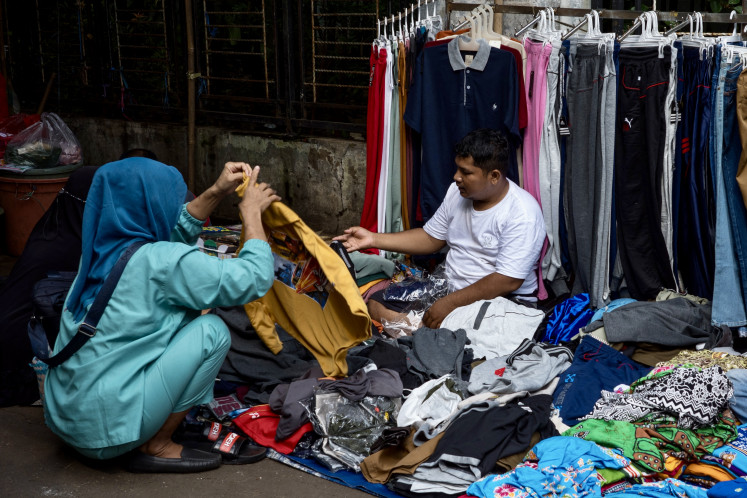Popular Reads
Top Results
Can't find what you're looking for?
View all search resultsPopular Reads
Top Results
Can't find what you're looking for?
View all search resultsSanctuary sought for Sumatran rhinos in Kalimantan
Two-horned creature: A Sumatran rhino is captured by a camera trap in West Kutai, East Kalimantan
Change text size
Gift Premium Articles
to Anyone
Two-horned creature: A Sumatran rhino is captured by a camera trap in West Kutai, East Kalimantan.(Courtesy of WWF)
The discovery of Najaq, a 10-year-old female Sumatran rhinoceros in West Kutai, East Kalimantan, in October 2015, has revived hopes for the critically endangered animal. Once believed to be merely a myth among Dayak communities in the region, now the government is preparing a sanctuary for Sumatran rhinos in Kalimantan.
Sumatran rhinos in Kalimantan were first discovered in a production forest near Besiq village in Damai district, West Kutai, in early 2013. Then direct confirmation arrived in October 2015 after cameras set up by a team of conservationists recorded Najaq wallowing in the mud, the first sighting of the species in Kalimantan in nearly 50 years.
A team consisting of conservationists from the World Wildlife Fund (WWF) and the Wildlife Conservation Agency (WCS) estimates that there are at least 23 other Sumatran rhinos in West Kutai.
The Sumatran rhinos in Kalimantan are believed to be a subspecies of the long-haired, two-horned rhinos found in Sumatra.
The discovery of the rhinos, once believed to be extinct, has prompted the Environment and Forestry Ministry to set up a sanctuary for the beleaguered animals, hoping that it will help protect the near-extinct species from destruction and help the rhinos breed and multiply. The ministry is preparing an area on the former gold mining concession of PT Kelian Equatorial Mining for the sanctuary. It is expected to be ready this year, Bambang Dahono, director of biodiversity conservation at the ministry, said. The construction of the site is waiting on an agreement between Environment and Forestry Minister Siti Nurbaya Bakar and the West Kutai administration.
The Kalimantan sanctuary will complement an existing sanctuary for Sumatran rhinos in the Way Kambas National Park in Lampung, named the Sumatran Rhino Sanctuary (SRS). Genetically, the rhinos in Kalimantan can breed with the species in Sumatra, he said, adding that a sperm bank would be set up to collect sperm from the two rhino groups to create a new generation of Sumatran rhinos.
It has been estimated that only around 1,000 ha of rhino habitat remain in Damai district, West Kutai, located among natural production forests, plantations and mining sites.
A joint study conducted by the Jakarta-based Eijkman Institute for Molecular Biology and the Bogor Agriculture Institute (IPB) examined a sample of Najaq’s dead body and concluded that the morphological and genetic conditions of rhinos in West Kutai bore a 98 percent resemblance to rhinos in Sumatra, prompting the decision to include the former as a subspecies of the Sumatran rhino.
“The most apparent difference is that the rhinos in West Kutai are smaller than the rhinos in Sumatra,” Bambang said.
Meanwhile, at the event on Tuesday, the ministry and a consortium of environmental NGOs launched a campaign to raise awareness about rhino conservation. The campaign is tagged with the title #KadoUntukDelilah (Gift for Delilah). Delilah is a baby female Sumatran rhino who celebrated her first birthday on May 12 and whose name was given to her by President Joko “Jokowi” Widodo in July last year.
The WWF, WCS, the International Rhino Foundation, the Indonesian Rhino Conservation Foundation (YABI), the Leuser Communication Forum and the Leuser International Foundation make up the consortium.
Currently living in the SRS in Way Kambas, Delilah is only the second rhino to be born in Indonesia’s rhino sanctuaries.
YABI executive director Widodo Ramono said he hoped the presence of Delilah would attract public attention to the Sumatran rhino.
Indonesia is home to the world’s two most endangered rhino species, the Javan and Sumatran rhinos.










